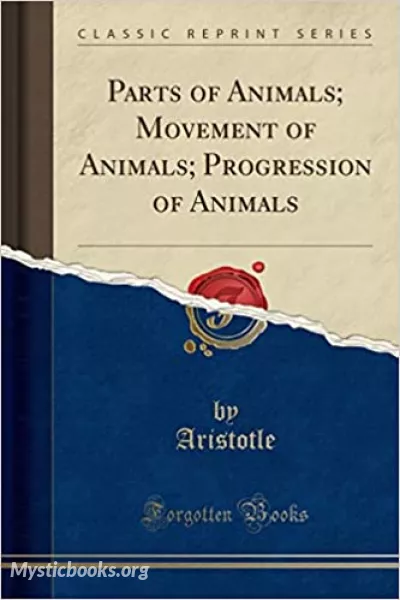
Movement & Progression of Animals
by Aristotle
'Movement & Progression of Animals' Summary
"Movement & Progression of Animals" is a seminal work in the field of biology and philosophy written by Aristotle, one of the most influential philosophers and scientists of the ancient world. The book offers an in-depth exploration of the movement and behavior of animals, and Aristotle's approach to scientific inquiry and his insights into the natural world have had a lasting impact on the study of biology and philosophy.
In "Movement & Progression of Animals", Aristotle divides the animal kingdom into different categories based on their physical characteristics and behaviors. He provides detailed observations and analysis of a wide range of animals, including birds, fish, insects, and mammals, and his insights into their physical abilities and movements continue to be influential in the study of animal behavior and physiology.
One of the key contributions of Aristotle's work in "Movement & Progression of Animals" is his observation that different animals move in different ways, and that their movements are directly related to their physical structures and abilities. He also noted that different animals have different levels of sensory perception, and that these differences impact their behavior and interactions with their environment.
In addition to its scientific significance, "Movement & Progression of Animals" is also notable for its philosophical implications. Aristotle's approach to scientific inquiry, which emphasized careful observation and categorization, was central to his broader philosophical ideas about the nature of the world and humanity's place within it. His work in biology laid the groundwork for his broader philosophical ideas about the nature of knowledge, truth, and the human experience.
Overall, "Movement & Progression of Animals" is a foundational work in the history of science and philosophy. Its insights into the movement and behavior of animals, as well as its broader philosophical implications, continue to be studied and discussed by scientists and scholars to this day. Aristotle's influence on the development of Western thought cannot be overstated, and his work in "Movement & Progression of Animals" remains a significant and enduring contribution to human knowledge and understanding.
Book Details
Authors

Aristotle
Greece
Aristotle (384–322 BC) was a Greek philosopher and polymath during the Classical period in Ancient Greece. Taught by Plato, he was the founder of the Lyceum, the Peripatetic school of philosophy...
Books by AristotleDownload eBooks
Unfortunately, no ebooks exist for this book, yet...
Listen/Download Audiobook
- Select Speed
Related books

Birds, Vol. II, No 6, December 1897 by Various
This volume of "Birds" is a beautifully illustrated publication that showcases the diversity and beauty of avian life. It features short poems, engagi...

Wongo And The Wise Old Crow by Grace Moon
Stories of an Indian boy and his friends told by a children’s author of yesteryear.

Birds and Nature, Vol. XI, No 3, March 1902 by Various
Published in 1902, this volume of *Birds and Nature* is a compilation of articles, poems, and anecdotes focusing on the natural world. It showcases th...

Birds of the Air by Arabella B. Buckley
Arabella Buckley had a great love of nature and wished to impart that love to children. Birds of the Air will encourage children to observe birds in t...

The Heart of the Ancient Wood by Sir Charles G. D. Roberts
This is a captivating book that transports readers into a world of enchantment and wonder within the depths of a timeless forest. This mesmerizing pie...

Natural History of Selborne by Gilbert White
The Reverend Gilbert White was the curate of the village of Selborne, a village in Hampshire, from 1784 to his death in 1793, living most of his life...

How To Have Bird Neighbors by S. Louise Patteson
The author provides the listener with anecdotes from her life of her experiences with birds. She describes their habits and antics, their food favorit...

Birds and Nature, Vol. XI, No 2, February 1902 by Various
This volume of "Birds and Nature" is a compilation of short poems, anecdotes, and factual descriptions about birds, animals, and other natural subject...

Brihadaranyaka Upanishad by Anonymous
The Brihadaranyaka Upanishad is one of the Principal Upanishads and one of the first Upanishadic scriptures of Hinduism. A key scripture to various sc...

The World’s Story Volume III: Egypt, Africa and Arabia by Eva March Tappan
A journey through the ancient civilizations of Egypt, Africa, and Arabia awaits you in this captivating book. The World's Story Volume III: Egypt, A...
Reviews for Movement & Progression of Animals
No reviews posted or approved, yet...